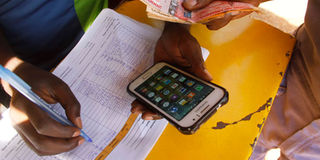Value of mobile money transactions reduces by Shs6.1 trillion

The value of mobile money transactions dropped in the 2018/19 financial year, according to Bank of Uganda. PHOTO BY ABUBAKER LUBOWA
What you need to know:
- Bank of Uganda is also currently seeking approval of the National Payments Systems Bill, which when approved and enacted into law, will govern mobile money and electronic transactions.
Less money was sent through mobile money platforms in the 2018/19 financial year compared to 2017.
The money, which was transacted in the period, dropped by Shs6.1 trillion, according to the Bank of Uganda annual report released last week.
Data from the report indicates that the value of mobile money transactions dipped to Shs66.9 trillion.
“The value of mobile money transactions decreased by 8.4 per cent from Shs73 trillion to Shs66.9 trillion during the same period,” the report released last week, indicates.
While the value of money sent through the platform reduced, the number of transactions increased.
“The number of mobile money transactions increased by 87 per cent from Shs1.3b to Shs2.5b during the year to June 2019,” the Central Bank said.
This essentially, means that more Ugandans used the service but sent less money.
The findings could be explained by the increase in mobile money users who saw a 12 per cent jump in 2018 to 25.8m users from 22.7m in 2017.
However, only 15.5m of those are active users, representing 59.9 per cent of the subscriber numbers.
According to Dr Fred Muhumuza, an economics lecturer at Makerere University, the report depicts the fall back from the mobile money tax introduced by government last year.
“People were sending voluminous money but since the tax is pegged on volume, some traders who would send money to different places realised to withdraw Shs3m could cost nearly Shs60,000. They resolved to collect and send the money themselves. It is no longer about convenience but the cost,” he said, adding that banks also saw an opportunity with the introduction of the tax to offer cheaper and affordable alternatives.
Government last year introduced a 0.5 per cent tax levy on withdraw transactions from which it collected Shs157.2b, shooting beyond its projected target of Shs115b.
Matters also worsened after telecoms increased withdraw charges earlier this year.
Regulating mobile money
Meanwhile, Bank of Uganda is also currently seeking approval of the National Payments Systems Bill, which when approved and enacted into law, will govern mobile money and electronic transactions.
“The NPS Bill was approved by Cabinet on June 24, 2019 and is now awaiting presentation on the floor of Parliament for enactment into law. With regard to mobile money service providers, regulations are being drafted to operationalise the NPS Bill. The regulations being drafted include electronic money issuers’ regulations, licensing regulations for payment service providers and sandbox regulations,” the Central Bank report indicates.
In the meantime, Supervised Financial Institutions receive complaints about the quality of service received.
A total of 367,194 complaints were received by SFIs last year of which 40.89 per cent were related to mobile and electronic banking while 34.77 per cent of the complaints were categorised as others.




